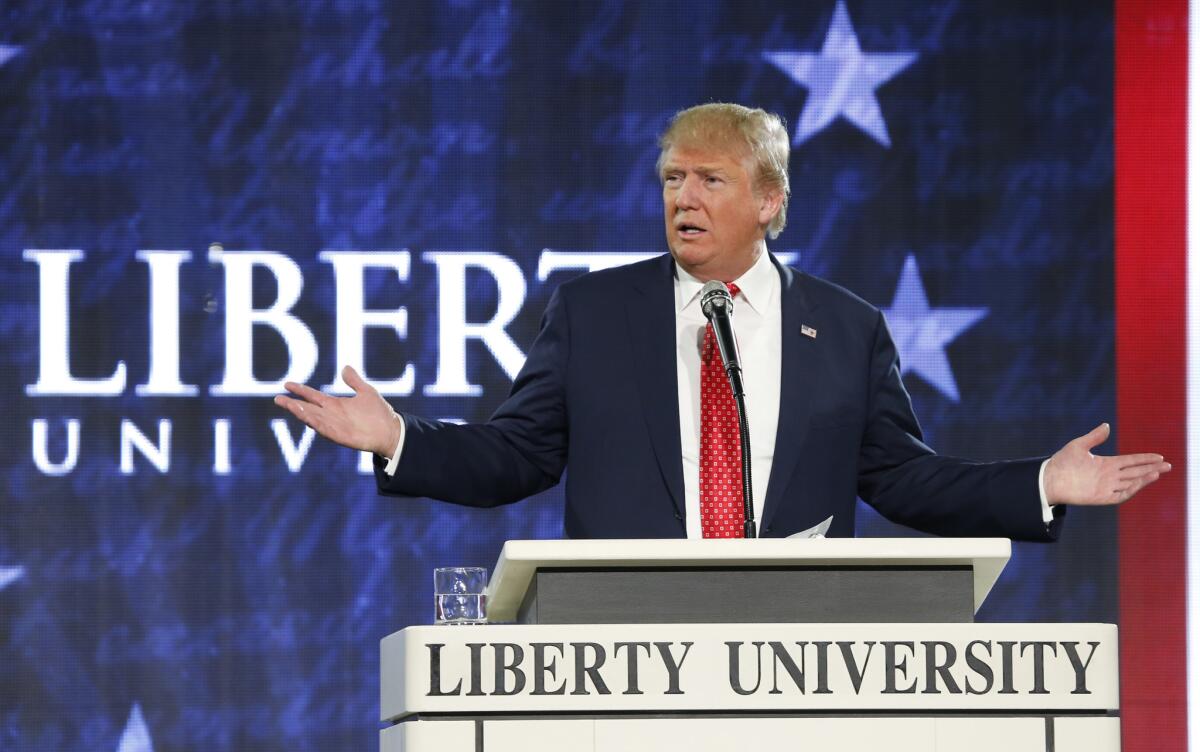Op-Ed: Trump doesn’t get it: Abortionists are criminals, women aren’t

Republican presidential candidate Donald Trump gestures during a speech at Liberty University in Lynchburg, Va on Jan. 18.
- Share via
In his latest gambit to capture the news cycle, Donald Trump said Wednesday that “there has to be some form of punishment” for women who abort. (His Director of Retractions shortly thereafter issued a clarification.) The Republican front-runner’s misguided notion contradicts historical legal strategies and is contrary to the long-held policies of state and national pro-life organizations.
Before the Supreme Court’s 1973 decision in Roe vs. Wade — which legalized abortion for any reason, at any time of pregnancy — state abortion laws targeted abortionists (those who performed abortions), not women.
The states understood that the point of abortion law is effective enforcement against abortionists; that the woman is the second victim of the abortionist; and that prosecuting women is counterproductive to the goal of effective enforcement of the law against abortionists.
Since time immemorial, the law has recognized that male coercion, abandonment or indifference has been at the center of most abortions.
Granted, as many as 20 state statutes technically made it a crime for the woman to participate in her own abortion. But these were not enforced.
In the 20th century, there were only two cases in which a woman was charged in any state with participating in her abortion: from Pennsylvania in 1911 and from Texas in 1922. In the 1911 case, the trial court threw out the charge and the Pennsylvania Superior Court concurred, stating that “in the absence of clear statutory authority, ‘the woman who commits an abortion on herself is regarded rather as the victim than the perpetrator of the crime.’”
As legal scholar Paul Linton has pointed out, “[a]lthough more than one-third of the States had statutes prohibiting a woman from aborting her own pregnancy [self-abortion] or submitting to an abortion performed on her by another, no prosecutions were reported under any of those statutes.”
Based on his research, Linton concluded, “no American court has ever upheld the conviction of a woman for self-abortion or consenting to an abortion and, with the exception of [the Pennsylvania case from 1911 and Texas case from 1922], there is no record of a woman even being charged with either offence as a principal or as an accessory.”
Likewise, before Roe, courts in a handful of states questioned whether the aborting woman might be a legal conspirator. But the issue in the recorded cases was not the woman’s guilt — no woman was charged or was a codefendant — but the admissibility of evidence against the abortionist.
Some states had statutes prohibiting solicitation of abortion — based on the general principle that solicitation of a crime is a crime — and these were evenhandedly applied to men and women.
But even the pro-abortion-rights historian Leslie Reagan, in her influential 1997 book “When Abortion Was a Crime,” acknowledged that women did not face criminal liability as principals, accomplices, conspirators or solicitors.
The claim that women will be jailed for abortion when Roe is overturned rests on a second myth: that the Supreme Court’s change of heart will result in the immediate re-criminalization of abortion.
But if Roe were overturned today, abortion would be legal well into the second trimester in at least 42 to 43 states tomorrow (and likely all 50 states) for the simple reason that nearly all of the state abortion prohibitions have been either repealed or are blocked by state court versions of Roe.
Extensive practical law enforcement experience in many states, over many years, is what led prosecutors not to target women. After Roe is overturned, that experience will certainly be influential with state policymakers who wish to effectively enforce abortion law.
Because we recognize that abortion is bad for both mother and child, pro-life leaders do not support the prosecution of women and will not push for such a policy when Roe is overturned. (Obviously, like Trump, any single legislator can spout their idiosyncratic ideas.)
Anyone who doubts this is the case should take a look at federal abortion regulations enacted in the last 20 years — such as the federal partial-birth abortion ban (2003) and the Unborn Victims of Violence Act (2004) — in which women are excluded from any possible prosecution.
To avoid any ambiguities, recent abortion bills in Congress have also expressly excluded women, including the Pain-Capable Unborn Child Protection Act, the Born-Alive Abortion Survivors Protection Act and the Prenatal Nondiscrimination Act.
Trump’s shoot-from-the-hip approach would overturn a century of law. If Trump tries to convert his hunch into policy, he’ll look around and won’t find any followers.
Clarke D. Forsythe is acting president of Americans United for Life, where he has been a lawyer for 31 years, and the author of numerous publications, including “Abuse of Discretion: The Inside Story of Roe vs. Wade.”
Follow the Opinion section on Twitter @latimesopinion and Facebook
More to Read
A cure for the common opinion
Get thought-provoking perspectives with our weekly newsletter.
You may occasionally receive promotional content from the Los Angeles Times.









